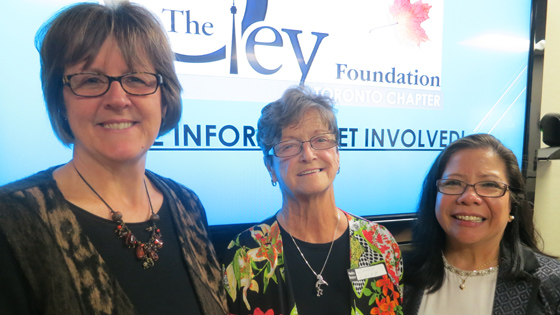
Dr. Johane Allard, Director of the Nutritional Support Program at UHN, Sandy Lacey and Clinical Nurse Specialist Olivia Saqui attend a TGH support meeting for caregivers, patients, and families of those who feed themselves through feeding tubes or catheters. (Photo: UHN News)
Thirty years ago, Sandy Lacey had most of her short bowel removed due to gangrene. She was then told that she would never be able to eat enough to survive.
"It was horrible," she recalls, "because I could not eat enough to keep myself alive. It was frightening."
Patients who have short bowel syndrome don't have enough bowel to absorb the nutrients and vitamins they eat. But Lacey, now 64, is alive, smiling, and practicing yoga due to the support she has received from her husband, other patients, and the home parenteral nutrition support clinic and group at Toronto General Hospital (TGH).
Recently re-energized by Clinical Nurse Specialist Olivia Saqui, the support group at TGH is involved in the Toronto chapter of the Oley Foundation, meeting monthly to educate, plan events and help patients who need to receive nutrition through feeding tubes or catheters.
There are 63 patients at TGH who use intravenous feeding at home because their digestive systems can't absorb or tolerate food eaten by mouth – the largest adult Parenteral Nutrition (PN) program in Canada. PN provides a special blend of liquid nutrients to be infused, for about 12 hours at a time through a catheter inserted in a vein. A small infusion pump and a backpack help patients to be mobile throughout the day and to travel.
Telehealth videoconferencing allows long-distance support and consultations for patients across Ontario. The TGH program receives up to five referrals a month from across the province.
"Support is essential," says Lacey, "we need to be aware and knowledgeable and to know that we are not alone. We're not that many, so this group is like life support for us. I feel safe. "
Saqui agrees. An advocate for PN patients for more than 33 years, she notes that these patients are "unique and that there are no supports for them. Some of these patients will need to feed themselves via PN for the rest of their lives. This affects their families and their sense of self."
Dr. Johane Allard, gastroenterologist at University Health Network (UHN) and Director of its Nutritional Support Program, and her team manage the Canadian Home TPN Registry, which collects secure health and other information on almost 500 PN patients across Canada. Data from the registry is used to better understand how to improve the care and quality of life of patients.
For example, vitamin K is added to the supplements and patients are closely monitored for signs of osteoporosis, as a result of the registry data showing higher rates of this condition. In another example, manganese was removed from the nutritional formula due to potential toxicity.
Developing this registry puts us ahead internationally since there is nothing like this anywhere else, says Dr. Allard, adding that its data will become even more vital in the future.
"We've never had so many PN patients as we do now at TGH," Dr. Allard says. "With an aging population undergoing more complex surgeries, we will experience an increase in demand for this service."
